
PHYTOPROTECTION
metrics 2024
Empowering Research for Healthier Plants
Introduction
PHYTOPROTECTION is a distinguished academic journal dedicated to the field of plant protection, published by the Quebec Society for the Protection of Plants. With an ISSN of 0031-9511 and an E-ISSN of 1710-1603, it serves as a platform for researchers, professionals, and students focused on the latest advances in plant protection methodologies, pest management, and sustainable agricultural practices. Although the journal's coverage in Scopus has been discontinued since 2010, its past publications encompass a wealth of valuable research from 1993 to 1994 and from 1996 to 2010, making it a crucial resource for those investigating plant health. The journal firmly positions itself as a fundamental contribution to the advancement of agricultural science, emphasizing research that addresses both contemporary challenges and future trends in the protection of plant resources.
Metrics 2024
 -
- 0.30
0.30 0.30
0.30 -
-Metrics History
Rank 2024
IF (Web Of Science)
JCI (Web Of Science)
Quartile History
Similar Journals

PHYTOPARASITICA
Illuminating the Dynamics of Plant and Insect Relationships.PHYTOPARASITICA, published by SPRINGER in the Netherlands, is a distinguished journal dedicated to the fields of Insect Science and Plant Science. With an impressive convergence of research from 1973 to 2024, the journal holds a notable position in academic circles, ranking in Q2 for both categories as of 2023, according to Scopus metrics. This places PHYTOPARASITICA within the top 67th percentile for Insect Science and the 59th percentile for Plant Science, reflecting its significant impact on research and advancements in these crucial fields. The journal is committed to disseminating high-quality, peer-reviewed research that addresses the interplay between plants and their parasitic organisms, contributing to the broader understanding of agricultural sustainability and ecological balance. Researchers, professionals, and students will find this journal an essential resource for cutting-edge insights and developments within its domain.
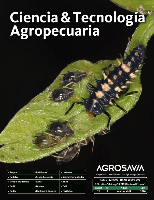
Revista Corpoica-Ciencia y Tecnologia Agropecuaria
Shaping the Future of Agriculture with Groundbreaking Studies.Revista Corpoica-Ciencia y Tecnologia Agropecuaria is a premier open access journal dedicated to the dissemination of innovative research in the field of agricultural and biological sciences. Published by CORP COLOMBIANA INVESTIGACION AGROPECUARIA-CORPOICA, this journal has been a key resource for professionals and academics since its inception in 1996, providing valuable insights into the challenges and advancements in agro-technology. As a recognized journal with a Q3 ranking in its category for 2023, it operates with a mission to enhance knowledge transfer and foster collaboration among researchers in Colombia and beyond. The journal is indexed in Scopus, which highlights its commitment to maintaining rigorous academic standards and broadening the scope of agricultural research. With an emphasis on advancing sustainable agricultural practices and technological innovations, Revista Corpoica serves as an essential platform for sharing groundbreaking studies, reviews, and original research that contribute to the growing body of agricultural knowledge. Researchers, professionals, and students alike will find this journal an invaluable tool to stay informed and engaged with the latest advancements in agricultural science.
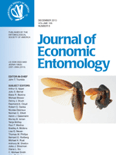
JOURNAL OF ECONOMIC ENTOMOLOGY
Connecting Entomology with Real-World ApplicationsJOURNAL OF ECONOMIC ENTOMOLOGY, published by OXFORD UNIV PRESS INC, stands as a premier interdisciplinary platform for researchers and professionals in the realms of entomology and ecological sciences. With a robust publication history dating back to 1945, this esteemed journal has consistently maintained its reputation for disseminating high-quality research, as evidenced by its prestigious Q1 rankings in both Ecology and Insect Science for 2023. The journal’s impact is highlighted by its excellent Scopus ranks, placing it in the top percentile of Agricultural and Biological Sciences and Environmental Science categories. Aimed at advancing the understanding of insects and their relationships with humans and ecosystems, the JOURNAL OF ECONOMIC ENTOMOLOGY offers a critical forum for original research articles, reviews, and opinion pieces that influence practices in pest management, conservation, and agricultural productivity. Although not an Open Access journal, its findings are pivotal for students, researchers, and professionals striving to address contemporary challenges in entomology and beyond.

ACTA AGROBOTANICA
Advancing botanical knowledge for a sustainable future.ACTA AGROBOTANICA, published by Polskie Towarzystwo Botaniczne, serves as a premier open-access journal in the fields of Agronomy, Ecology, and Plant Sciences. Established in 1953, this journal presents a rich history of scholarly contributions, showcasing significant research findings and advances within the botanical domain. Operating under an Open Access model since its inception, ACTA AGROBOTANICA fosters accessibility and dissemination of knowledge, crucial for researchers, professionals, and students alike. The journal currently holds a respectable Q3 ranking in prominent categories such as Agronomy and Crop Science, Ecology, Evolution, Behavior and Systematics, and Plant Science as of 2023, reflecting its growing impact within the scientific community. With a dedication to exploring diverse botanical issues in Poland and beyond, this journal remains a valuable platform for innovative research and critical discourse in botany.

Bioagro
Connecting minds through groundbreaking agricultural science.Bioagro is an esteemed academic journal dedicated to advancing research in the field of Agricultural and Biological Sciences. Published by the University Centroccidental Lisandro Alvarado in Venezuela, this journal has made significant strides since its inception in 2008, with a focus on delivering high-quality research publications that address contemporary challenges in agriculture and biology. Recognized for its contributions, it holds a Q3 ranking in the Agricultural and Biological Sciences (miscellaneous) category as of 2023, and it ranks #125 out of 221 in its field, placing it in the 43rd percentile. Although it operates on an Open Access model, Bioagro strives to provide broad access to innovative research, thereby fostering collaboration and knowledge dissemination among researchers, professionals, and students. With a commitment to include a wide range of topics, the journal aims to be a pivotal platform for exploration and dialogue in agricultural sciences, ensuring that key findings reach both scientific and practitioner audiences. Located in Barquisimeto-Cabudare, Lara, Venezuela, Bioagro invites submissions that contribute to the global discourse on sustainable practices and innovations in agriculture.
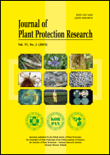
JOURNAL OF PLANT PROTECTION RESEARCH
Bridging science and practice for a healthier planet.JOURNAL OF PLANT PROTECTION RESEARCH is a pivotal publication in the realm of agricultural sciences, dedicated to advancing our understanding of plant protection and pest management. Published by the INST OCHRONY ROSLIN, PANSTWOWY INST BADAWCZY in Poland, this journal has been an open-access venue since 2008, ensuring that research findings are readily accessible to a global audience. With an ISSN of 1427-4345 and E-ISSN of 1899-007X, it serves as a crucial platform for scholars and practitioners in the fields of Agronomy, Plant Science, and Soil Science. In the latest categorizations, it has achieved a Q3 ranking in these disciplines, reflecting its impact and significance within the scientific community. As the journal converges its scope from 2008 to 2024, it continues to address pressing issues in plant health and sustainability. Its strategic placement within the Scopus ranks offers valuable insights into agricultural and biological sciences, making it an essential read for those seeking to enhance their expertise in plant protection strategies.
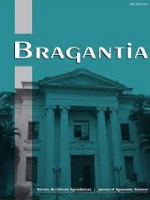
BRAGANTIA
Cultivating Insights for Agricultural ExcellenceBRAGANTIA, published by the Instituto Agronômico, is a distinguished open access journal that has been a vital resource since its inception in 1977. With an ISSN of 0006-8705 and E-ISSN 1678-4499, this journal is recognized for its contributions to the field of Agricultural and Biological Sciences, where it currently holds a respectable Q2 ranking as of 2023. Additionally, BRAGANTIA is indexed in various databases, supporting its impact within Materials Science (Q3 ranking). Positioned in Brazil, the journal promotes the dissemination of high-quality research, aiming to bridge the gap between academia and practical applications in agricultural innovation and sustainability. Researchers, professionals, and students looking to keep abreast of recent advancements and their implications will find BRAGANTIA to be an indispensable platform for sharing and accessing vital agricultural knowledge.
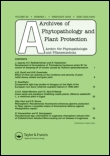
ARCHIVES OF PHYTOPATHOLOGY AND PLANT PROTECTION
Transforming Challenges into Sustainable Solutions for AgricultureArchives of Phytopathology and Plant Protection, published by Taylor & Francis Ltd, stands as a pivotal platform in the field of agronomy and crop science since its inception in 1974. With an ISSN of 0323-5408 and E-ISSN of 1477-2906, this journal is dedicated to publishing high-quality, peer-reviewed research that addresses contemporary challenges in plant pathology and protection. As a Q3 ranked journal in its category with Scopus Rank #210/406, it serves a vital role in disseminating practical solutions and innovative discoveries to enhance agricultural productivity and sustainability. The journal fosters a rich exchange of ideas among researchers, professionals, and students, empowering them to contribute to the advancement of the agronomy and biological sciences. Despite being traditionally subscription-based, the journal's commitment to comprehensive and rigorous research makes it an essential resource for anyone invested in the future of plant health and agricultural innovation.

Revista Caatinga
Fostering Collaboration in Agricultural and Biological ResearchRevista Caatinga is a premier open-access journal published by Universidade Federal Rural do Semi-Árido (UFERSA), dedicated to the dissemination of significant research within the field of Agricultural and Biological Sciences. Since its inception in 2006, the journal has aimed to bridge the knowledge gap in various aspects of agricultural practices and biological phenomena, making vital contributions to the scientific community. With its publications indexed in Scopus and holding an impressive Q2 categorization in the competitive landscape of agricultural sciences, the journal ranks within the top half of its category (100/221), demonstrating a commitment to quality scholarship. The journal is based in Brazil and covers a wide array of topics relevant to both local and global agricultural challenges. By fostering open access, Revista Caatinga ensures that vital research is available to a broad audience, promoting knowledge sharing and collaboration among researchers, practitioners, and students around the world.
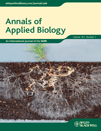
ANNALS OF APPLIED BIOLOGY
Fostering breakthroughs in applied biological research.Annals of Applied Biology, published by Wiley, stands as a pivotal resource in the fields of Agronomy and Crop Science, boasting an impressive impact factor that reflects its significance and influence in the academic community. With a storied history dating back to 1914, this journal serves as a comprehensive platform for innovative research and applied studies in agricultural biology, specifically aimed at improving crop production and sustainable practices. Currently categorized in the Q1 quartile for Agronomy and Crop Science in 2023, it ranks an admirable 82 out of 406 in the Scopus database, placing it within the top 79th percentile of its category. Researchers, professionals, and students worldwide rely on the Annals of Applied Biology for cutting-edge insights and advancements in applied biological research, making it a vital component of the scientific discourse aimed at addressing pressing agricultural challenges. Please note that this journal does not offer open access options, thus ensuring a rigorous peer review process and the integrity of published work.